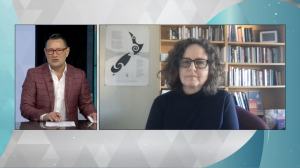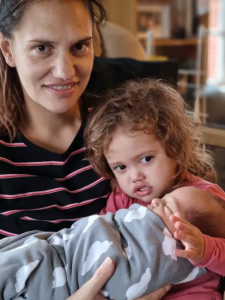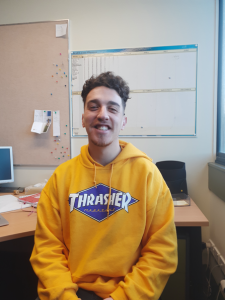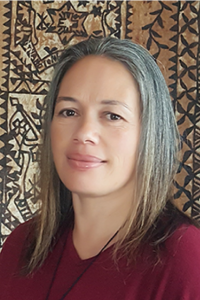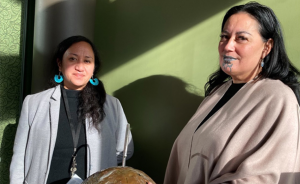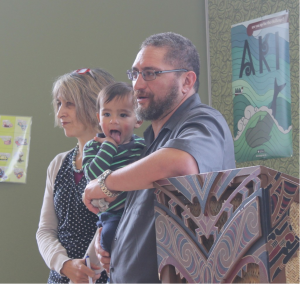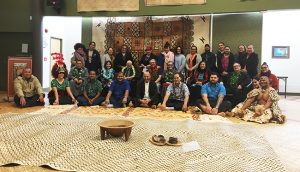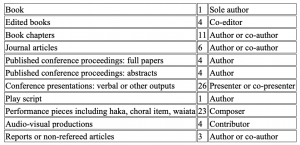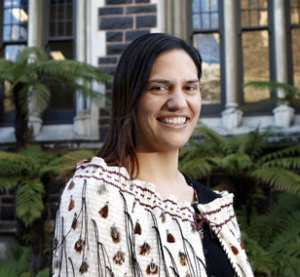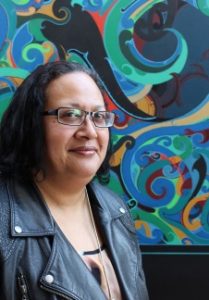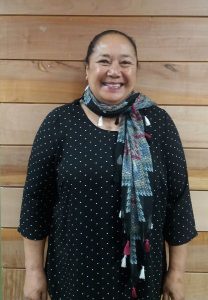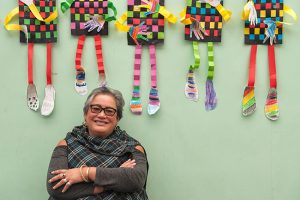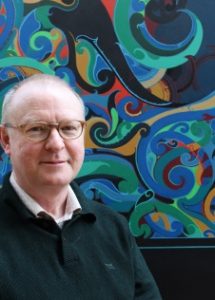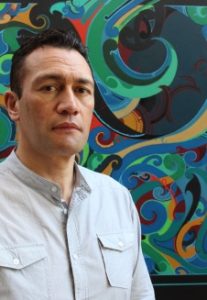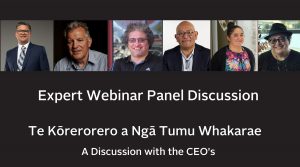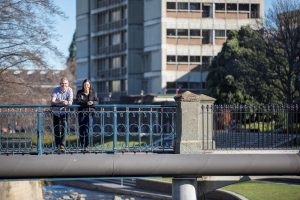Te Tumu staff in the Māori media
Erica Newman‘s Marsden funded research on the descendants of Māori who were adopted into Pākehā families is continuing to attract attention in the Māori media. Recently she was interviewed by Māori TV, with an accompanying story in Stuff. Click here to access these. She also features in Te Karaka, the Ngāi Tahu magazine. Click on TE-KARAKA-88 (1) to access the magazine (a great read!): the story featuring Erica’s research, and her family history are on pages 38-41.
Paerau Warbrick has always been interested in politics, and his own academic research delves into the some of the lives and contests of historical Māori politicians. Paerau is also always happy to chat and give his opinion on what’s happening now. A couple of days ago, he wrote an opinion piece on National’s use of race as a political tool for E-Tangata. This explores more recent and current National Party leaders and how they did (or could) play the “race card” to their best advantage. Not everyone will necessarily agree with Paerau, but his piece will make you think.
Michelle Schaaf offers commentary on Dawn Raids apology
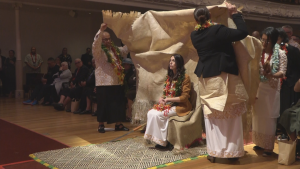 It is great when Te Tumu academics are called upon to comment on important national events as they happen. Yesterday the Prime Minister made an formal apology for the dawn raids of the 1970s when Pasifika people were indiscriminately targeted by the police and officials as “overstayers”. The PM also took part in an ifoga ceremony to assist with healing these traumatic events. Click here for the full One News account, with extensive commentary from Pacific Islands Studies lecturer, Dr. Michelle Schaaf.
It is great when Te Tumu academics are called upon to comment on important national events as they happen. Yesterday the Prime Minister made an formal apology for the dawn raids of the 1970s when Pasifika people were indiscriminately targeted by the police and officials as “overstayers”. The PM also took part in an ifoga ceremony to assist with healing these traumatic events. Click here for the full One News account, with extensive commentary from Pacific Islands Studies lecturer, Dr. Michelle Schaaf.
What’s been going on?
There haven’t been too many blogs in the last six months but that will change, with more news coming through as it happens. But to clear the decks, this is a roundup of research news since December. As indicated in the last round-up, Te Tumu was going through a lot of changes with a number of staff retiring or heading off to greener pastures. Since then, even more have moved on; with Tangiwai Rewi also leaving to join Poia in Wellington, and take up a role with the Ministry of Education. But we are really happy that Tangiwai and Gianna Leoni are maintaining links with Te Tumu as affiliate researchers.
Lachy Paterson came back from RSL (Research and Study Leave) at the start of June, and Michael Reilly has just started his year of RSL from 1 July. RSL is an opportunity to engage more deeply with research without the usual demands of teaching and administration, although with Covid, any overseas travel is now impossible. We also won’t be seeing Karyn Paringatai for some time as well. Congratulations to Karyn and Neihana on the birth of Mātahi, a little brother for Manuhou. Karyn is enjoying maternity leave at present, and this will be followed by her scheduled RSL.
We have been lucky to have three new academic staff join us, which is helping to fill the gaps left by our departing staff. Paia Taani joined the Māori Studies team at the start of the year, and was joined more recently by Kare Tipa; both are teaching te reo Māori papers. In addition, Emma Powell joined the Indigenous Development team, and among other things, will be teaching the INGS 501, the core paper in the Master of Indigenous Studies programme next year.
In addition, we have four teaching fellows also helping out, and now occupying the second floor: Leighton Williams (MAOR110: Conversational Māori); Kahurangi Tīpene (MAOR208: Ngā Manu Taki); Val Houkamau (MAOR102: Māori Society); as well as Julia Wilson organising the logistics for Te Tumu’s module in POPH192: Population Health.
And to help facilitate our various research projects, Jade Higgan McCaughan is working as a research assistant for Te Tumu staff. Jade is a former MIndS student, and staff are already making bookings to access his time and expertise.
Paia Taani.
Since beginning my lecturing position in January I have been focusing on three main kaupapa; teaching, confirmation and my PhD. The kaupapa for my doctoral research is about tracking intergenerational transmission of te reo Māori within my own whānau. Whānau narratives of their experiences and perspectives of te reo Māori will form the foundation of my thesis to address the question: How can whānau experiences of te reo Māori loss and, where applicable, reclamation, influence future intergenerational transmission of te reo Māori?
My application for a PhD Doctoral Support Grant from Ngā Pae o te Māramatanga was successful and this also includes ongoing support through fortnightly Zoom hui with other postgraduate tauira from around the motu and to listen to guest speakers. During these hui, tauira will have the opportunity to present their research to the group, so I am looking forward to doing this in September. I will also be presenting at Te Wānaka Rakahau – Ākoka/Student Research Symposium which is held at the University of Otago at the end of August.
Paerau Warbrick
Paerau has completed two articles this year. One has just been published in the June 2021 Journal of New Zealand Studies and is called ‘Māori Election Petitions of the 1870s: Microcosms of Dynamic Māori and Pākehā Political Forces’. Click on the link to read it.
The other is called ‘Price of Citizenship for Māori. A matter of historical and legal context’. The article is to appear in a special upcoming edition of the Journal of the Australia and New Zealand Legal History Society which is now called law&history. The focus of the article tracks the legal concept of citizenship for Māori from pre European contact through to the late 1940s.
Currently, Paerau is working on two further articles. One is on the monumental election battles in 1884, 1887 and 1890 over the Eastern Māori seat in Parliament between James Carroll and Wi Pere. Paerau is analysing individual polling booth data to explain the factors of how Carroll managed to unseat Wi Pere in 1887 and maintain the seat in the 1890 election.
The other article is a commentary on New Zealand’s most senior Māori politician, Winston Peters (former deputy PM and long time Māori MP). The article emphasises that Winston Peters must first and foremost be analysed in terms of him being Māori. He is not a person who is to be analysed in terms of him having ‘Māori ancestry’ or ‘Scottish ancestry’. Peters’ world view is totally in line with his Māori world view. And this is the key to understanding the man and his political positions over time.
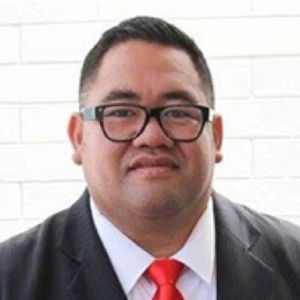 Vaivaimalemalo Michael Ligaliga
Vaivaimalemalo Michael Ligaliga
Michael has been busy recently as Expert Panellist for Royal Commission of Inquiry into Abuse in State and Church Care, Auckland NZ. “I am currently preparing to provide expert advice and on the potential use of indigenous redress practices as a solution to providing closure, voice, reconciliation for victims of abuse. Furthermore, I have been asked to provide a discussion around the advantages and disadvantages of indigenous reconciliation processes such as Samoa’s ifoga, Fiji’s isorosoro, Hawaii’s Hoooponopono, and Tonga’s Fakalelei. How do we apply these reconciliation processes in Aotearoa New Zealand?”
He has also been engaging with the Asia Pacific Institute for Gender-Based Violence (API-GBV) in California, USA. “API-GBV approached me to translate the Power and Control Wheel. The wheel is globally used to identify the different types of violence and abuse. I have been working on translating the Power and Control Wheel into the Samoan language. In addition to this, I have been participating in online zoom listening sessions with GBV and domestic violence service providers, researchers, and government agencies discussing the application of the Power and Control Wheel in the Samoan space. It is intended that after these discussions, a new violence model for Samoan communities will be developed and introduced.”
Lachy Paterson.
The RSL time has been mostly engaged in the Te Hau Kāinga: Māori Home Front project looking at Māori experiences in New Zealand during the Second World War. We have a fairly large team undertaking research, which will eventually end up in a book. Have a look at the “stories” we are posting to our website as we go, which gives a flavour to some of the stuff we are finding out. There are some interesting stories there.
One of the great things about this projects is that we were fortunate to employ six Māori students on Summer scholarships (two of which were part-funded with Humanities Māori Summer Scholarships), supervised by Angela Wanhalla and Miranda Johnson of the History programme, and Erica Newman and myself from Te Tumu. Leighton Williams and Val Houkamau are Te Tumu students; Talia Ellison is a Te Tumu graduate, now doing a Master of Peace and Conflict Studies; Zoe Thomas is majoring in History, with a minor in Indigenous Development; and Bethany Waugh is an Anthropology student. We had one non-Otago student, Rebecca Lee Ammunson from Waikato, studying History, English, and te reo Māori. Check out their projects and research reports.
Part of Angela’s and my work has been to discuss the project and build relationships, and I have met with archivists and librarians at Pukekohe Library, Archives New Zealand, Canterbury Museum, Christchurch City Library and Auckland Museum, Hokianga Museum, Te Ahu (Far North Museum), and the curators of Te Kōngahu Museum of Waitangi and Te Rau Aroha Museum on the Waitangi Treaty Grounds. Angela Wanhalla and I also presented a Zoom seminar on the project to the programme of the La Trobe University History programme, looking at some ongoing aspects of Māori life during the war, namely religious activities, as well as petitions and protests over past grievances.
My other project was to further a book I am writing on a history of Māori-language print culture. I was lucky to be invited to give a key note on Māori-language newspapers to the Bibliographical Society of Australia and New Zealand Conference held in Adelaide late last year. Of course my hopes of being there in person were scuppered by Covid, so instead I gave the talk by Zoom, which was recorded and put on Youtube.
Emma Powell and Kare Tipa were featured in the Uni News. Read about here. Kare has been active in promoting the use of te reo Māori me ōna tikanga, with Hui Whakatau held every Monday morning at 8.30 in Te Tumu. Come along!
Emma Powell
Before beginning in my new role at Te Tumu, my research work was focused on the submission of my PhD. That work – ‘Akapapa‘anga ara tangata: Genealogising the (Cook Islands) Māori imaginary – was a highly abstract and theoretical engagement with the genealogical practices of my people. I described those practices in three modes: cultural practice, cultural paradigm and research method. In those modalities, I then discussed various contemporary political and cultural issues that have surfaced in public discourse over the last decade. Many parts of my PhD have inspired the seeds for new projects that I will begin here at the University of Otago.
The first is a piece of work about the genealogical, cultural and constitutional imbrications of the New Zealand Realm with a particular focus on the Cook Islands. The idea of the New Zealand Realm, with its many (and relatively unresearched) parts, lends itself well to collaborative projects. I recently co-edited an article about the New Zealand Realm and, along with colleagues from the University of Auckland, University of Waikato, Massey University, AUT and Lousiana State University, we have submitted it for publication. I also presented early ideas about the problems of the Realm’s constitutional geography with Miranda Johnson (in the History programme at the University of Otago) at the Empire & Ecologies: Transimperial, transhistorical and transregional natures from the 17th to the 21st century symposium, hosted by University College Dublin.
Alongside teaching in the coming months, I will be working on turning my PhD into a book and hope to organise a workshop where I can invite colleagues and mentors to workshop the manuscript with me. I also look forward to collaborating with Erica Newman on a writing project, and meeting with graduate students and colleagues from the University of Waikato and AUT in preparation for conference season, November to December 2021.
Erica Newman has had two MIndS students successfully complete with distinctions, who will be graduating this year. She reports:
“I gave a presentation for the sixth annual CCARHT (Cambridge Centre for Applied Research in Human Trafficking) Summer Symposium on the 29th June. My presentation was titled ‘Māori patterns of adoption’ where I discussed the differences between whāngai and the introduced European laws of adoption. The latter were established for the adoptive parents, and as the adoptee has no say, and the 1955 Adoption Law severed connections between all parties, this can be seen as a legal practice of trafficking babies. Something that would not happen (that I have not been aware of) within te ao Māori.
“As a result of that symposium I am currently working on an article for the Journal of Modern Slavery. I am also working on several other articles, and blog posts for the Te Hau Kāinga: Māori Home Front project.
“At the moment my main focus is on my Marsden project, and Te Hau Kainga Marsden project. As part of my Marsden I made a trip to Christchurch to Oranga Tamariki Adoption Services head office where I met with a number of Adoption Practice Managers, Practice Leaders, Regional Service Managers, Policy Law/Reform staff and Ministry of Justice Law Adoption Reform team leader. My visit was to introduce myself and my research project and to discuss the effects of the current adoption legislation for descendants of Māori adoptees. This proved to be a very positive meeting which allowed me to gain an insight to their perspectives and to make them aware of issues from a descendant’s point of view. This has given rise to a ongoing relationship, where I now have contacts within the adoption services whom I can contact if I need clarity on anything for myself and for the collaborators on this research project.
“As part of this project, I went to Wellington a couple of weeks ago and had a follow up meeting with Ministry of Justice where we discussed the new Adoption Law Reform Discussion document. This included looking at all the different aspects of the current 1955 Adoption Law and how this could be changed, even discussing whether we needed an adoption law moving forward. They asked me lots of questions from my point of view as a descendant of a Māori adoptee as well as from my research findings.
“Whilst in Wellington I also met with MP Paul Eagle (Labour) who is a Māori adoptee himself and very focused on the law reform. We discussed my research and different aspects of adoption especially for Māori.
“Oranga Tamariki Adoption Services have asked me if I would agree to being interviewed and filmed to discuss my story as a descendant of a Māori adoptee.”
—
Well, that’s all for now. Expect more news soon.
Te Tumu’s First Professor Emeritus
Poia Rewi (Ngāti Manawa, Tūhoe, Te Arawa, Ngāti Whare and Tūwharetoa) was appointed as a Senior Lecturer in Te Tumu, School of Māori, Pacific and Indigenous Studies at the University of Otago in 2003. Previously he had been a Māori Studies academic at the University of Waikato from 1992. In 2016 he was promoted to professor. He ended his service at Te Tumu in mid-2020 in July 2020 when he took up the role of Chief Executive/Tumu Whakarae of Te Mātāwai, a government organisation established under Te Ture mō Te Reo Māori 2016/The Māori Language Act 2016, to foster and support Māori language development for iwi.
Although the honour of professor emeritus is normally awarded to professors retiring from academia, the University’s Policy for the Award of the Title of Emeritus Professor allows the title to be made to a Professor who resigns, for example, to take up a distinguished public position. Poia’s illustrious academic career (discussed below) and his leadership within Te Tumu and the university induced Professor Michael Reilly and other Te Tumu colleagues to seek this honour for our recently departed Dean.
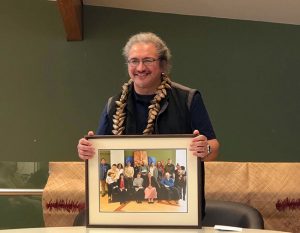
Professor Poia Rewi at his farewell at Te Tumu, 24 June 2020, with a photo featuring his Te Tumu colleagues.
Speaking to the Otago Bulletin Board on Poia’s departure in July last year, Professor Reilly described Poia as a “deeply humble, modest man who believes that it is for others to speak of the kumara’s sweetness.”
“His abiding passion is always first and last, te reo Māori. He advocates for its use by all New Zealanders. In his teaching and writing he always encourages his students and others to seek out and to utilise the rich diversity of language forms that the reo has inherited from the ancestors.”
“In Te Tumu Poia was generous with his time and showed hospitality to all. He became well known for volunteering to work in the kitchen, always concerned to ensure visitors, staff and students had plenty of food; a mark of the true leader, one who always thought of the well-being of others.”
Poia places much value on the importance of teaching the new generation, and work within the community. The growing success of his postgraduate students attests to his influence, and in 2012 he received the Otago University Students’ Association Supervisor of the Year Award. His knowledge of the reo and Māori performing arts resulted in him being appointed a judge at many regional Māori-language speaking competitions as well as being a judge at national, regional and tribal Māori performing arts competitions (adult/senior and high school levels).
Te Reo Māori has always been his passion. In 1997 he received a certificate as a translator and interpreter of te reo Māori from Te Taura Whiri i Te Reo Māori/The Māori Language Commission. This is an exceedingly hard qualification to attain and demonstrates his high level of proficiency in the Māori language. In 2005 Poia completed the first PhD solely in Te Reo Māori at the University of Otago. It was a study of whaikōrero or Māori oratory through the words of a group of some 30 respected elders, many of them highly regarded orators on the marae throughout the country.
Subsequently, he revised and translated the thesis into English for publication as Whaikōrero: The World of Māori Oratory, published by Auckland University Press in 2010. This book was the first major publication to study this major Māori art form. In 2011 it was awarded the New Zealand Society of Authors – E. H. McCormick Best First Book Award for Non-Fiction. Later, it became the basis for a 12 part Māori Television documentary, ‘Whaikōrero’, which won the Broadcasting-Māori medium category in Ngā Tohu Reo Māori 2014/the Māori Language Awards 2014.
As a researcher his dominant focus has been Te Reo Māori and the associated performing arts. As a teacher of the reo to second language learners he has always been interested in the revitalisation of the reo and this became the centre of his research in more recent years. In 2010 he was a lead investigator for two major grants from Ngā Pae o te Māramatanga, a national Centre of Excellence: ‘He Iho Reo, Developing a toolbox to support Māori Language Transmission and Maintenance’ ($226,439), and ‘Te Pae Tawhiti: “Te Kura Roa,”’ a jointly commissioned research project with Rāwinia Higgins of Victoria University of Wellington ($1,500,000). A number of reports and publications were generated from these grants including
- Day, D & Rewi, P., ‘Te Kura Roa wānanga wawata: Inter-department Specific- enablers/inhibitors’, 2013. Twelve individualised reports distributed to each of the 12 participating Government departments, approximately 667 pages.
- Higgins, R., Rewi, P., Olsen–Reeder, V. (eds.), The Value of the Māori Language: Te Hua O Te Reo Māori, Wellington: Huia Publishers, 2014,
- Day, D., Rewi, P. & Higgins, R. (eds.), The Journeys of Besieged Languages, Newcastle upon Tyne, UK: Cambridge Scholars Publishing, 2016.
Further to his academic pursuits, Poia has been a prolific writer of Māori narrative over the years manifesting in published works as haka compositions, waiata, Māori language plays, fiction and nonfiction. This has resulted in several texts published in the Pikihuia short stories series. Poia himself has also adjudicated the Pikihuia Māori writers’ awards for a number of years. His most recent writing accolade was acknowledged in 2020 for a te reo Māori text.
Poia has completed 86 outputs, as shown in the summary on the left.
Poia served as Dean of Te Tumu between 2015 and 2020. Another significant leadership role at Otago was as Associate Dean Māori, Division of Humanities, 2012-2014. He was also Deputy Director of Ngā Pae o te Māramatanga, a national Centre of Research Excellence, between 2018-2020.
His recognition as a leader in the Māori world was evidenced by his service as Acting Chief Executive of Te Taura Whiri i Te Reo Māori/The Māori Language Commission from 2014-2015. He was also a member of the Commission’s Board between 2012-2015. This outstanding service within, but also outside the university, helped pave the way to his new role at Te Mātāwai. Poia was elected in 2021 as a Fellow of the Royal Society of New Zealand Te Apārangi, “celebrated as one of the most active research specialists in Māori culture, language revitalisation, oral history and performing arts.” Yet, due to his modesty, even some of his Te Tumu colleagues had no idea of the extent of his scholarship.
Poia Rewi always said when he first came down to Otago 18 years ago he had only wanted to stay for a few years before heading back up to the North Island. We knew that he was only on loan to us, and it was an honour to have him for the time that that we did. E hoa, me kore ake koe hei ārahi i a mātou, arā, i ō hoa mahi o Te Tumu me te whare wānanga, i te ao Māori kei waho o te whare wānanga, me ngā tini tāngata e kimi ana, e whakaū ana, e whakapiki ana i te reo Māori.
[Thanks to Professor Michael Reilly and Dr Tangiwai Rewi for information for this post.]
2020 Te Tumu Research Round-up
Well, it’s been a weird year for everyone, and the coronavirus certainly made our work harder, with a lot of our energy going into making sure we were able to still offer quality teaching to our students. We have also had a number of staff move on to greener pastures: Jim Williams and Lyn Carter retired; Gianna Leoni left us to take up a research role with Te Hiku (where former colleague Suzanne Duncan also works); Megan Pōtiki has shifted to the Office of Māori Development in the university; and Poia Rewi has taken up the Tumu Whakarae (CEO) position at Te Mātāwai. So we are expecting to see a bunch of fresh faces in the new year.
Research has still carried on. As the Chair of our Research Committee, Michelle Schaaf says, “Despite Covid, the retirement and departure of staff; the research committee’s commitment to building a successful research culture continues and owes its success to the oversight and guidance provided by senior staff directly. The committee continues to monitor staff research activity and promotes staff research through various mediums: research website long running and informative Research Blog.”
We also asked staff to tell us about their research, and what they’ve been up to. Here are their replies.
Karyn Paringatai’s Marsden
Karyn is lead investigator on the Marsden project: E kore au e ngaro! The enduring legacy of whakapapa (awarded $823,000), which looks at the importance of whakapapa in health, in particular to whānau that carry the cancer-causing hereditary mutation in the CDH1 gene.
2020 started with good intentions to advance my Marsden research with a lot of face-to-face engagement sessions planned, but those plans fizzled quickly during the March-April lockdown. But things have picked up during the second half of the year with a lot of gusto. In September I met with Maybelle McLeod, Pauline Harawira and Erin Gardiner from Kimihauora Health and Research Centre in Tauranga to co-develop a research topic for future PhD student, Kahurangi Salu. Pauline and Maybelle were two of the four lead investigators of the research project that discovered the CDH1 gene mutation. A conversation with Pauline went as follows:
Pauline: “My mother was from Hicks Bay.”
Me: “Oh wow.”
Pauline: “Yeah her younger brother, we called him Uncle Boy, his first name was Manuhou. His middle name was Paringatai. He was named after that koroua that died in the war.”
FUN FACT: My whānau are based just over the hill from Hick’s Bay. My daughter is called Manuhou Paringatai. She was named after that same koroua who died in the war, my grandfather’s first cousin. Whakawhanaungatanga – well and truly achieved.
Check out this short video featuring Karyn and the wider project.
This meeting coincided with a wider whānau hui. It was an opportunity to speak to whānau, canvas opinions, make connections, and recruit participants. The concerns they expressed were echoed in my research objectives. As a result I have been involved in developing a post-surgery nutrition research project and a funding proposal for a Kaihautū – someone who will help develop a pre- and post-surgery management care plan that takes in to account Māori realities. Watch this space……
Michelle Schaaf’s research
The Covid pandemic really pushed me to think of what the different ways are, that I could have students demonstrate what they know. There’s been a lot of me letting go of control, to try and build resilient and more-independent students. Teaching remotely also made me look at my own course content with fresh eyes. In terms of my research, I was forced to be adaptable, and implement strategies to mitigate the long-term impact of research disruptions.
new Publications
UORG: “Childhood in a changing Pacific”
Freeman, R.M. Schaff, C. Ergler, M. Kivalu, A. Niusulu, T. Tua’a and H. Tanielu, Childhood in Changing Pacific’ Summary Research Report August 2020, (Summary Research Report), Dunedin: School of Geography, University of Otago.
Childhood in Changing Pacific’ Summary Research Report Presentation and Exhibition. 10 November 2020. This was a report presentation to participants and their families, in Dunedin and Samoa, on campus and via zoom platform. See here for more.
Articles submitted
“Kinship and belonging: Pacific children’s perspectives on the diaspora” to the Childhood Journal.
“Connections to community and culture, a photographic analysis of place attachment amongst Pacific Island children” submitted to Children’s Geographies.
Telesia Kalavite’s latest article
Telesia has recently published an article, “Toungāue cooperative pedagogy for Tongan tertiary students’ success” in the Waikato Journal of Education, 25, 1 (2020). You can read it here.Toungāue cooperative pedagogy
Abstract
Cooperative Pedagogy specific to Tongans can enhance students’ academic success in New Zealand’s tertiary education. Tongan students’ success depends on teachers’ recognition and understanding of Tongan students’ sociocultural context which involves their pule‘anga (bureaucracy), famili/kāinga (family), siasi (church) and fonua (country) relationships. Tongan students should not be treated within the Pacific groupings because ‘Pacific’ is a term of convenience for peoples who originate from different countries in the Pacific region whose cultures are uniquely different from one another. The term ‘Pacific’ tends to make these students live in the shadow of being treated as if they have the same needs in the classroom. The culturally specific needs of Pacific students are obscured by the assumption that they are homogenous. Academics and educational authorities in New Zealand need to recognise the importance of Pacific students’ culturally specific needs in their educational environments to move towards solving the problems of underachievement. This article explores the use of a culturally specific Tongan Toungāue Cooperative Pedagogy for teaching Tongan students in New Zealand tertiary education. Toungāue Cooperative Pedagogy is rooted in Tongan students’ sociocultural context which is at the heart of the Tongan society. More importantly, this proposed Toungāue Cooperative Pedagogy is transferable and could also be beneficial to other Pacific and Indigenous cultures.
Keywords
Toungāue cooperative pedagogy; Tonga tertiary students’ success; Pacific diversity; Pacific ethnic special needs.
Tangiwai Rewi’s projects.
Most of the research related mahi I have been consumed by since 1 July has involved the 0.2 FTE Ngā Pae o Te Māramatanga co-management of the Te Pāpanga Te Reo Māori, Ngā Tikanga Māori (TRMNTM) mahi along with Dr Gianna Leoni with the departure of Professor Poia Rewi. The list includes:
- Running a Te Kōrerorero a Ngā Tumu Whakarae webinar hosted on the last day of Māori Language week 18 September 2020 to encourage eight CEO’s to share their ideas about working together for te reo Māori research under Te Papa Kōrero. The purpose of Te Papa Kōrero is to provide coordination and leadership for the implementation of both Maihi (Maihi Māori and Maihi Karauna) in respect of the Māori language strategy. We managed a 50% success rate by confirming Shane Taurima (Māori Television), Larry Parr (Te Māngai Pāho), Dr Poia Rewi (Te Mātāwai) and Ngahiwi Apanui (Te Taurawhiri) to participate in the session facilitated by Dr Gianna Leoni and myself (from Te Tumu at the University of Otago), in our roles as the NPM Co-Managers of Te Reo & Ngā Tikanga Māori Platform. We aim to invite the other four Chief Executives of Te Puni Kōkiri; the Ministry of Education; the Ministry for Culture and Heritage and the Department of Internal Affairs, who were unavailable on this occasion, to join another webinar at a later date.
- N03 Project Te Reo me ngā Tikanga Māori – Named Scholarship – Professor Wharehuia Milroy; Understanding, articulating and measuring the language shift at the micro-level As part of the Ngā Pae o te Maramatanga Summer Internship Projects 2020-21 we were asked to develop, organise and then manage and supervise this named scholarship to recognise the scholarship and leadership of the late Te Wharehuia Milroy to the revitalisation and normalisation te reo me ngā tikanga Māori. In doing so, the intern will review and develop an understanding of Milroy’s research and scholarship, that is specific to te reo Māori normalisation and excellence. Dr Gianna Leoni will be the NPM Investigator who will work alongside Ria Tomoana (Kaiwhakahaere Rangahau – Te Mātāwai) to supervise the student.
- The third project we have been doing is our Collectivising Ngā Pae o Te Māramatanga Publications which we presented on at the 9th Biennial International Indigenous Ngā Pae o te Maramatanga (NPOTM) conference online 18-20 November. In three phases, the first produced punchy, attention grabbing abstracts summarising the articles.The second attributes keywords to the articles along with word clouds. To ensure accessibility after these two phases, the third phase thematicises the lists so that any person wanting to know what articles are published in each issue can search via content themes. Phase 1 comes to an end this year while phases 2 and 3 will look at completion by end of April 2021.
On a personal research note:
- I continue to push through with my Tuupuna Times research project holding wānanga for whānau and hapū on request, on how to collect stories from their tuupuna.
- My research plan for RSL is a little off beam given the attention to the Ngā Pae o Te Māramatanga workload. However, the next two months will be busy getting that back on track, assisted gratefully by the Te Koronga continued funding support of $5000 development grant this year and recent success with my UORG application He Whakapakari Ake i Te Tuakiri Maaori of $11, 434 which takes effect 1 January 2021.
- I contributed a Māori perspective to a paper, Ko tā te Māori aronga ki te whakamātao kikiri. A Māori perspective on embryo cryopreservation, which is currently being reviewed by the lead author.
- I still have two articles to complete by the start of next year!
That’s it!
What is Michael Reilly doing?
Since 2019 I have off and on been working on a Māori tribal history manuscript. It currently is organised around the chief themes of tribal traditions: creation, culture heroes, the waka migrations, and the stories about the many generations of descendants who settled and populated this new country. The latter extends over a wide range of topics such as rangatiratanga or leadership; mana wāhine, mana tāne or gender relationships; and possibly, the place of emotion words such as whakamā, or shame, and pōuri, or grief. Each chapter is organised around a selection of traditions on the topic from different iwi. Attention is paid to southern traditions where possible. These traditions are normally taken from published sources, often collections of traditions with a limited analysis or explanation of the content of the narratives.
My aim is to provide the cultural context of these stories in order to help the modern reader understand the layers of meaning found within each text. This often involves an immersion in older ethnographic works by the likes of Elsdon Best, Te Rangihīroa and Raymond Firth who put on record information shared with them by generations of Māori scholars. By locating the texts within this ethnographic record, I can better peel back the layers of meaning found in each of the stories. To me, it opens a window upon that ancient world of the ancestors, Te Ao Kōhatu, the Stone World, as Bruce Biggs once described it. This approach resembles the kind of work I have been pursuing for some years, both in Aotearoa and in the wider world of Ancient East Polynesia, notably Mangaia.
Behind this approach lies an influential model: Erich Auerbach’s Mimesis: The Representation of Reality in Western Literature. He began writing it while in exile as a German Jew teaching in Turkey during the Second World War. Each of his chapters selects a passage from an author, from Homer through to Virginia Woolf. He uses each of them to explore ideas about how Western literature has sought to represent the world. His aims differ from mine but some of his methods have encouraged me to try and explore the totality of Māori traditions from its beginnings in time down perhaps as far as the edgy beginnings of modern Aotearoa, ending however, in the early nineteenth century when Māori understandings of their world remained dominant. For it is their story after all I am interested in.
More recently, I have initiated other smaller projects after approaches to provide publications either for edited books or journals. One looks at emotions in Oceania, drawing on selected texts from particular Island societies, including Mangaia and Aotearoa, that illustrate important concepts such as love, shame and grief. I am also interested in comparing the different words used to describe the human organ or centre of emotions, such as ngākau and manawa.
Currently, with the help of a research assistant, Jade Higgan McCaughan, I am examining evidence found in the songs published in the four volumes of Ngā Mōteatea, edited by Apirana Ngata and other scholars. Another project was prompted by plans to celebrate the coming of the London Missionary Society to the Cook Islands. I decided to look at some letters by a 19th century Mangaian church minister, Mamae. In one he describes his experience of a hurricane, while in others he gently criticises the editing of local texts by his colleague, William Wyatt Gill; an interesting case of the native speaking back. We see Mamae as a skilled writer who is actively participating not only in the recording of traditions, but also in how it is presented in published form. These kinds of letters give a window into the work and contributions of an important early scholar and missionary whose name, however, is far less well known that Gill’s, for it is the latter’s name that appears on the title pages of the ethnographic studies these two men collaborated in producing.
All this work takes place in the small intervals of relative calm permitted to me when I am not busy either teaching or discharging the responsibilities of Acting Dean of Te Tumu, a role bequeathed to me by Poia Rewi on his departure for Te Mātāwai in Te Whanganui-a-Tara.
Erica Newman’s exciting new project
Erica is lead investigator in a new fast-start Marsden project beginning in 2021: Journey Home: Descendants of Maori adoptees search for their turangawaewae. Only researchers who have recently completed their PhDs are eligible to apply for a Fast Start Marsden grants.
This research will investigate the ripple effects of the 1955 Adoption Act from which some Māori adoptees grow up not knowing their whakapapa, and look at the journeys that some of their descendants undertake in the search for their tūrangawaewae. Erica’s project has already attracted quite a bit of media attention, on te aka kumara, and waatea news, which is useful for getting the project out there to the descendants who may want to make contact with Erica. There is also a closed Facebook page just started, “Descendants of Māori Adoptees”, a safe space for these descendants to ask questions, share stories and support each other.
Erica was also asked to come on the team of the Marsden-funded project, Te Hau Kāinga: Histories and Legacies of the Māori Home Front, 1939-45, to contribute research on tikanga, whānau and adoption
Erica teaches in some large classes, and says that she found challenging converting on-campus papers to on-line. “This year has been quite draining with covid, and the future is a little unsettling when thinking about teaching, not knowing whether we will (or won’t) go into more lockdowns next semester.” But she is keenly looking forward to getting into her research.
Dr Paerau Warbrick’s goings on
In terms of research this year, I have been beavering away at articles.
Recently I have had an article accepted by the Australia & New Zealand Law & History journal, which will be published later in 2021. It is on Māori and Citizenship. And it takes a look at what this phrase ‘citizenship’ meant for Māori up until the 1950s.
My research is taking on a distinctly historical political flavour, on the heels of my 2019 article in the New Zealand Journal of History about Māori elections in the nineteenth century.
I have finished a chapter for a book edited by Lachy Paterson, myself and Megan Pōtiki on Māori texts, contexts, and their resonances for today. This chapter looked at Hēnare Tomoana, MP for Eastern Māori 1879-1884, and his pivotal role in the fall of George Grey’s Government in 1879.
Recently I submitted an article to the Journal of New Zealand Studies. It looks at the two Māori Election Petitions that try to unseat the MPs Karaitiana Takamoana (Eastern Māori) in 1876 and Hone Mohi Tāwhai (Northern Māori) in 1879. In order to understand these petitions, you really have to come to grips with the complex wider political machinations of the Fox, Vogel and Donald McLean political blocs, and the George Grey and John Hall group of MPs in Parliament.
Currently, I am working on an article for the Journal of Polynesian Society on the monumental election battles between Wi Pere and James Carroll over the Eastern Māori seat between 1884-1890. It is an attempt at historical psephology where I use fragmented polling booth data to uncover complexities in the Māori communities in the Eastern Māori election. I am looking at submitting this to the journal by mid-December 2020 or more realistically late January 2021.
This past year has definitely been a challenge for everyone. I wish everyone a safe and reflective Christmas and New Years. Mauri ora koutou.
Lachy Paterson’s doings
Lachy is lead investigator, with Angela Wanhalla (History) on the Marsden-funded project: Te Hau Kāinga: Histories and Legacies of the Māori Home Front, 1939-45, looking at what life was like for Māori in New Zealand during the Second World War, and how these experiences shaped Māori society in the years following the war. He is currently on RSL.
This project incorporates a large team. Alongside Angela Wanhalla and I, we have Erica Newman (as discussed above) as research associate, and five research assistants (one of whom is based in Wellington, and another in Auckland). We’ve also two excellent student researchers, Hannah Barlow and Stacey Fraser, both history post-graduates with research aligning with our project. It’s also been wonderful to be able to fund Māori summer scholarship students, with three who undertook projects last summer. Due to the travel restrictions, we have been unable to go to several overseas conferences, so redirected some of those funds into more summer scholarships. This summer we have six young Māori students (two partially funded through the Humanities Māori Summer Bursaries) who have just started their projects.
A key tool for our project is the Te Hau Kāinga website, which is fully bilingual. The site features a Stories page where we are posting research as we go along. It’s a bit eclectic, but definitely worth a read. The stories are also circulated to Facebook pages: our own FB page @maorihiomefront, the NZ History Teachers page, and the Māori-language versions onto the Te Mana o te Reo Maori page.
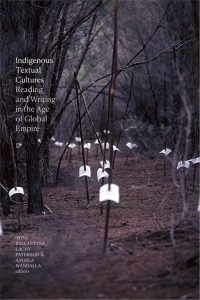 I have been fortunate to see a couple of publications appear this year. Indigenous Textual Cultures: Reading and Writing in the Age of Global Empire was recently published with Duke University Press, 2020. This project came out of a 2014 symposium in Dunedin featuring a number of eminent international scholars, and Tony Ballanyne, Angela Wanhalla and I co-edited the collection of essays that came out of the symposium.
I have been fortunate to see a couple of publications appear this year. Indigenous Textual Cultures: Reading and Writing in the Age of Global Empire was recently published with Duke University Press, 2020. This project came out of a 2014 symposium in Dunedin featuring a number of eminent international scholars, and Tony Ballanyne, Angela Wanhalla and I co-edited the collection of essays that came out of the symposium.
Sometimes things take time. I attended a symposium on colonial newspapers at Yale University in 2017, looking at the notion of Habermas’s “public sphere” within colonial societies, presenting on Wellington Māori letters in Te Karere o Poneke in the 1850s. This was recently published as “Te Karere o Poneke: Creating an Indigenous Discursive Space?” in “Special Issue: Colonial Public Spheres and the Worlds of Print”, Itinerario: Journal of Imperial and Global Interactions,44, 2 (2020) edited by Emma Hunter and Leslie James.
My argument is that if you used the conditions of the Habermasian model of a public sphere (a rather Eurocentric theory) it was difficult to apply to Māori of the Wellington period in the 1850s. They were not urban, bourgeois, or anti-clerical, nor in control of the media. But the impact of colonialism nevertheless gave them new ways of looking at the world, and that this newspaper gave plenty of scope for them to articulate them.
I have also submitted a chapter, “Race and Revolution: Haiti and the Kīngitanga, 1863” for a new book, edited by Lyndall Ryan and Angela Wanhalla, on Aftermaths: Remembering Colonial Violence in New Zealand, Australia and the Pacific. This should appear with Otago University Press in 2021. I was also asked to contribute a case study for the planned Edinburgh Companion to British Colonial Periodicals, and have written (but not yet submitted) a piece entitled, “Making Māori citizens in Colonial New Zealand: the Role of Government Niupepa.” I anticipate this coming out in 2022 with Edinburgh University Press.
Another project is to write a book on Māori print culture, from the first book in 1815 through to the present. I have pretty much written a draft, but this needs some extra work and refinement. And as Paerau mentioned above, he, Megan Pōtiki and I have a planned edited collection on Māori-language texts that we plan to get on to when we have a spare breath.
Marsden Success for Dr Erica Newman
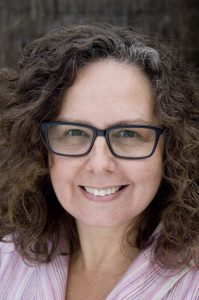 This has been a great year for Dr Erica Newman whose research project, Journey Home: Descendants of Māori adoptees search for their tūrangawaewae, has been awarded a $300,000 Marsden Grant over three years. This is wonderful news for Te Tumu, who now have three staff undertaking Marsden-funded research.
This has been a great year for Dr Erica Newman whose research project, Journey Home: Descendants of Māori adoptees search for their tūrangawaewae, has been awarded a $300,000 Marsden Grant over three years. This is wonderful news for Te Tumu, who now have three staff undertaking Marsden-funded research.
Summary: Māori adoptees who have no knowledge of their Māori heritage pass the unknown to their descendants. Focusing on these descendants, this project will explore; how they identify with their taha Māori, avenues they have taken to connect to their taha Māori, and how they are accepted by their whānau and hapū. I will follow participants on their journey of discovery and will examine hapū membership eligibility. Oral narratives will be the primary base for this project with published and unpublished sources used to support and highlight issues the participants encounter. This will begin a new area of research that will highlight the issues of transracial adoption on identity and well-being for descendants of Māori adoptees in Aotearoa New Zealand. [Advisor: Associate Professor Angela Wanhalla.]
Erica was also one of the award winners featured by the Royal Society Te Aparangi.
For the complete list of 2020 Marsden grant awards, click here.
Te Tumu’s “new” lecturer
Te Tumu is excited to announce the appointment of a “new” lecturer. Of course, many will already know Dr Erica Newman, as she has studied and worked in Te Tumu in various roles over many years. Moving into a confirmation-path lecturer’s role in the Indigenous Development programme is the culmination of all her hard work.
Erica’s research has focused on children and adoption. She undertook her BA (Hons) in Te Tumu, completing a dissertation on Māori, European and “half-caste” children in New Zealand from 1840-1852, with a specific focus on the care of children. She followed this with her MA, a history of adoption/whāngai within Aotearoa New Zealand, including the concept of “whāngai”. This research contains a special emphasis on transracially adopted Māori children and its effects on future generations, something pertinent to Erica’s own whakapapa. Her PhD, completed in 2018, looked at the adoption of children in Fiji during British colonial rule of 1874- 1970, including both indigenous and colonial practices and institutions. Erica has also attended various conferences, and published on her research, including an article on transracial adoption in the prestigious American Indian Quarterly in 2013.
More recently Erica has managed to get through to the second stage of a Fast Start Marsden application on the historical effect of adoptions for descendants of Māori adoptees, how adoption not only affects the adoptee, adoptive parents and biological parents but the ripple effect carried down to following generations. This includes the importance of whakapapa in how Māori adoptees are able to, or not able to, identify themselves as Māori. We have our fingers crossed that Erica’s Marsden bid is successful, as this will be exciting and useful research.
Erica has managed a strong research trajectory despite a heavy teaching load. She has long been responsible for Te Tumu’s giant MAOR102 Māori Society paper, managing hundreds of students each year and a troupe of tutors. Last year she was part of team organising Te Tumu’s modules in the (even larger) POPH192 Population Health paper. But since 2008 Erica has also taught in a variety of other papers in all of Te Tumu’s programmes over the years, as well have undertaken supervision duties in the Master of Indigenous Studies programme. We’ve seen a number of innovations, such as an in-house journal for the MAOR202 Tikanga and Māori paper, to give undergraduate students an idea of what it is like to publish an article, and developing special tutorials for MAOR102 students who come to university already very knowledgeable on tikanga Māori.
So in many ways, not too much is going to change for Erica—she will still be working flat-tack on her research and teaching. It’s just wonderful that we can all celebrate in her success.
Webinar with leading Māori CEOs.
Do you want to listen to listen to some inspiring Māori leaders? Join a webinar hosted by Te Tumu’s Dr Tangiwai Rewi and Dr Gianna Leoni, on behalf of Ngā Pae o te Māramatanga on Friday, 18 September at 2pm. You will hear the words of wisdom from the following CEOs: Shane Taurima (Māori Television), Larry Parr (Te Māngai Pāho), Ngahiwi Apanui (Te Taura Whiri i te Reo Māori) and Dr Poia Rewi (Te Mātāwai). Click here for more info and to register.
Te Tumu input into international cancer research
Regular readers of this blog will know of Karyn Paringatai’s research work. Not only is she an award-winning teacher, an advanced te reo Māori practitioner, and kapa haka aficionado, but she is also undertaking Marsden-funded research on Māori and gastric cancer in collaboration with Professor Parry Guilford of the university’s Centre for Translation Cancer Research. What follows is an update of this research, and some media links for those wanting more information.
Hereditary diffuse gastric cancer (HDGC): updated clinical practice guidelines
Māori are three times more likely to develop stomach cancer than people of European descent. Māori are one of the few populations worldwide where diffuse-type gastric cancer is more common than intestinal-type stomach cancer. Diffuse gastric cancer is an aggresive type of cancer that grows rapidly in the cells of the stomach wall – it does not form a mass or a tumour. These cancer cells spread widely and quickly and it makes it difficult to diagnose. The reasons for this high occurrence of diffuse stomach cancer are unclear but a relatively high frequency of the inherited CDH1 variants in the Māori population is one important reason. When working properly the CDH1 gene controls the growth of cells. But because it has mutated it allows cells to grow uncontrollably – including cancer cells. This genetic mutation is particularly prevalent amongst Māori, but many are unaware of the risk.
When Dr Karyn Paringatai was tested for a CDH1 variant 11 years there were only 3-4 Māori whānau with mutations in this particular gene. That number has since increased to between 12-15 Māori whānau. This prompted researchers and health professionals working in this area and affected whānau and families from all around the world to gather in Wānaka in March 2019 to update the previous management guidelines for HDGC published in 2015. A number of important new and revised recommendations are made in these updated guidelines, which was recently published by Lancet Oncology. However, most pertinent to Māori was that the whānau of any Māori person who has been diagnosed with diffuse stomach cancer be encouraged to have a genetic test, regardless of any other family history. Previously, the guidelines were largely based around the number of cases of this cancer in a family. 11 years ago Karyn had to fight to be tested and prove that she was at risk of HDGC, which was tough to do with her scant knowledge of her whānau’s medical history. That is no longer the case.
Professor Parry Guilford (Te Aho Matatu, Centre for Translation Cancer Research, University of Otago), the lead author of the article, states, “It is very uncommon in international guidelines to single out sub populations, so this is quite a significant move that we hope will reduce their risk as well as helping to reduce inequities in health for Māori.” Karyn, a co-author of these guidelines, is actively encouraging Māori to be tested and to make contact with her for any advice on how to do so. It is important to do so – for the future of our whakapapa.
This research is linked to Karyn’s Marsden funded project E kore au e ngaro – The enduring legacy of whakapapa.
Click here for a link to the updated guidelines in Lancet Oncology
Click on the links in the titles below to access media reports.
| Three, Newshub Live at 6pm, 10/08/2020, Samantha Hayes and Mike McRoberts |
| There are likely to be several hundred Maori unaware they are at high risk of an inherited form of stomach cancer, a New Zealand research team has suggested. The team from the University of Otago is hopeful updated international clinical practice guidelines they helped develop will encourage these people to be tested. |
| Radio NZ – National, Checkpoint, 10/08/2020, Lisa Owen |
| Report by Meriana Johnsen. A move to make it easier to get tested for stomach cancer is expected to save the lives of whanau Maori, and in particular, the several hundred Maori who are unaware they are at risk. New guidelines developed by the University of Otago and Kimihauora Research Clinic allow Maori to be tested for the genetic mutation CDH1 even if there is only one other family member with stomach cancer. |
| Radio NZ – National, 15:00 News, 10/08/2020 | |||||||
| A new testing criterion for identifying stomach cancer developed by Otago University and the Kimihauora Research Clinic is anticipated to save the lives of whanau Maori. Otago University’s Senior Lecturer at the School of Maori, Pacific, and Indigenous Studies Karyn Paringatai says Maori would have fewer holes to jump through.
|
|||||||
| Stomach cancer test to save whanau Maori lives | |||||||
| Radio New Zealand, Other, 10/08/2020 | |||||||
| A move to make it easier to get tested for stomach cancer is expected to save the lives of whānau Māori, and in particular, the several hundred Māori who are unaware they are at risk. New guidelines developed by the University of Otago and Kimihauora Research Clinic allow Maori to be tested for the genetic mutation, CDH1, even if there is only one other family member with stomach cancer. |
| Testing expected to save Maori from stomach cancer |
| Radio New Zealand, Other, 10/08/2020 |
| A research team hopes Maori lives will be saved with a new testing criteria for stomach cancer. The University of Otago and Kimihauora Reseach Clinic have developed the new criteria to make it easier for Maori to be tested for the genetic mutation that leads to the cancer. |
| Changing international guidelines to save Maori lives |
| Radio New Zealand, Other, 10/08/2020 |
| Researchers have managed to get a change to international clinical guidelines to ensure Maori are tested for a gene which causes stomach cancer. Otago University Professor Parry Guilford explains to Jesse why this gene is more prevalent in Maori and can be identified before a person gets cancer. |
| New clinical guidelines for stomach cancer testing aim to improve outcomes for Maori |
| Newshub, Other, 10/08/2020, Dave Goosselink |
| An Otago University team has developed new clinical guidelines for testing stomach cancer in New Zealand – especially in Maori. Maori have a higher risk of developing the disease, due to a cancer-causing gene passed down through some whakapapa. |
| Research team hopes Maori lives will be saved with new testing criteria for stomach cancer |
| New Zealand Doctor Online, Other, 10/08/2020 |
| There are likely to be several hundred Maori unaware they are at high risk of an inherited form of stomach cancer and a New Zealand research team is hopeful updated international clinical practice guidelines they helped develop will encourage these people to be tested. The University of Otago and the Kimihauora Health and Research Clinic’s (Mt Maunganui) work in understanding the role of variants (mutations) in the CDH1 gene in familial stomach cancer and the subsequent development of a genetic test, has dramatically reduced the number of deaths from this form of inherited cancer. |
| A research team hopes Maori lives will be saved by new testing criteria for stomach cancer |
| NZCity, Other, 11/08/2020 |
| Otago University Professor Parry Guilford was part of the research team which in 1997, discovered a gene mutation that makes people more likely to get stomach cancer. He’s now helped develop a new set of testing guidelines for it. |
| Research team hopes Maori lives will be saved with new testing criteria for stomach cancer |
| University of Otago, Other, 10/08/2020, Liane Topham-Kindley |
| There are likely to be several hundred Maori unaware they are at high risk of an inherited form of stomach cancer and a New Zealand research team is hopeful updated international clinical practice guidelines they helped develop will encourage these people to be tested. The University of Otago and the Kimihauora Health and Research Clinic’s (Mt Maunganui) work in understanding the role of variants (mutations) in the I gene in familial stomach cancer and the subsequent development of a genetic test, has dramatically reduced the number of deaths from this form of inherited cancer. |
| Newstalk ZB (Auckland), 10:00 News, 11/08/2020 |
| Otago University Prof Parry Guilford has helped develop new testing guidelines for his 1997 research, with the hope that it will make it easier for Māori to get tests to find out if they have stomach cancer-causing genes. |
| Newstalk ZB (Auckland), 10:00 News, 11/08/2020 |
| Otago University Prof Parry Guilford has helped develop new testing guidelines for his 1997 research, with the hope that it will make it easier for Māori to get tests to find out if they have stomach cancer-causing genes. |
Te Hau Kāinga Summer Scholarships
Are you a Māori university student? Would you like to a do a research project over summer – and get paid for it? The Te Hau Kāinga: Māori Home Front project has three summer scholarships available, starting in December. Under supervision, you can develop your own research project in your own home area, whether a historical report, a mōteatea, a video, or such like – something that you can share with your whānau and community. Or you can undertake a project with one of our partner institutions. If you’re keen and interested, read the information and get in touch! If you know of someone who might be interested, please pass this on to them.
2020/2021 Summer Scholarships
Te Hau Kāinga is a University of Otago-based research project supported by the Marsden Fund to investigate Māori experiences within New Zealand during World War Two. The project is offering three summer scholarships for 2020/2021 for Māori students in their second year or above enrolled at a New Zealand university. The purpose of the scholarships is to enable a promising student the opportunity to undertake sustained research work over the summer period.
Under the supervision of the project leaders, successful applicants will get to design their own projects and outputs, in English, i roto i te reo Māori rānei, which may include (but not be limited to) a written history, waiata, exhibition, or artwork that can be shared with whānau. Alternatively, Te Hau Kāinga can suggest a suitable research project, perhaps based in one of our partner institutions. Depending on the nature of the proposed research, successful candidates can be based anywhere within New Zealand. Summer scholarship recipients will also be involved in public initiatives designed to showcase the project to the wider community, including writing a blog post about their research.
Conditions
- Each scholarship has a value of $5,000 to be paid as a stipend in four instalments directly to the student’s nominated bank account (see details of payment dates and conditions below). Extra funding for travel or other expenses will be available if required.
- The student is expected to contribute a minimum of 400 hours (or ten weeks) to the project, starting in December.
- The approved research project will take place, exclusive of vacation time, between December 2020 and February 2021.
- All applications and associated documents must be submitted by 5pm Thursday 1 October 2020. These will include: a brief curriculum vitae (including a statement detailing any research experience to date, and contact details for two academic referees) and an academic transcript. If you have your own ideas about what you would like to research, please also attach a one-page research plan.
- The successful applicant will be a student of New Zealand Māori descent who was studying at 200 level or higher in 2020, and who will be enrolling for study at Otago or another New Zealand university in 2021. Applicants with suitable skills and a background in the humanities and/or the social sciences are eligible. Students considering enrolling in a postgraduate degree, typically an Honours, Masters or PhD programme, are especially welcome to apply.
- Summer Scholarships are not to be used to fund student research being undertaken for credit towards a degree/diploma.
- The student must not be receiving alternative scholarship support for the same project or any other project over the same timeframe. The student may hold only one Summer Scholarship in total.
- Students who currently hold a PhD or Master’s Scholarship are not eligible for a Summer Scholarship. Students with one of these scholarships and who are on a deferral over the summer period are also not eligible for a Summer Scholarship.
- The studentship will be paid by the University of Otago Scholarships Office in three instalments of $1,500 with a final $500 payment in March providing a satisfactory report on the project is received no later than 28 February 2021.
To discuss the scholarship and possible projects please contact the project leaders: info@maorihomefront.nz.
If you wish to apply, complete and submit this Te Hau Kāinga application form.
Check out the research outputs of previous summer scholarship recipients.
Connor Aston, Ngāti Ruanui (Waikato University) For Kīngi and Country: Waikato During the Second World War.
Dylan Thomas, Raukawa, Hauraki (University of Otago) Māori and Hockey: More than a Game.
Jordan Quinnell, Ngā Ruahine, Taranaki, Tūwharetoa (Massey University) [Artworks]
https://www.maorihomefront.nz/en/whanau-stories/the-trench-digger/
https://www.maorihomefront.nz/en/whanau-stories/jordans-second-image/
For further information on the Te Hau Kāinga project, please see: https://www.maorihomefront.nz/
Project Leaders: Professor Lachy Paterson,
Te Tumu: School of Māori, Pacific & Indigenous Studies
University of Otago.
Ph: 03-479-8462
Associate Professor Angela Wanhalla,
History Programme,
University of Otago.
Ph: 03-479-8462

